Career Self-Awareness: Know Your Strengths, Own Your Weaknesses, and Become the Real Deal

Career Self-Awareness: Know Your Strengths, Own Your Weaknesses, and Become the Real Deal
After more than 20 years recruiting in the built environment, and interviewing well over 4,000 candidates, I've come to believe one thing above all: the most undervalued career skill isn't technical expertise or industry knowledge. It's self-awareness.
Not the fluffy, social-media version of self-awareness. I mean the real kind. Practical, job-specific self-awareness. The kind that helps you walk into a performance review or interview and clearly articulate what you're great at, what you do to be good at it, where you need to improve, and how you're working on it.
It sounds simple. But it's surprisingly rare.
Why It Matters
When I ask a candidate, "What does your employer get in return for your $120K salary?", the answers often sound something like this:
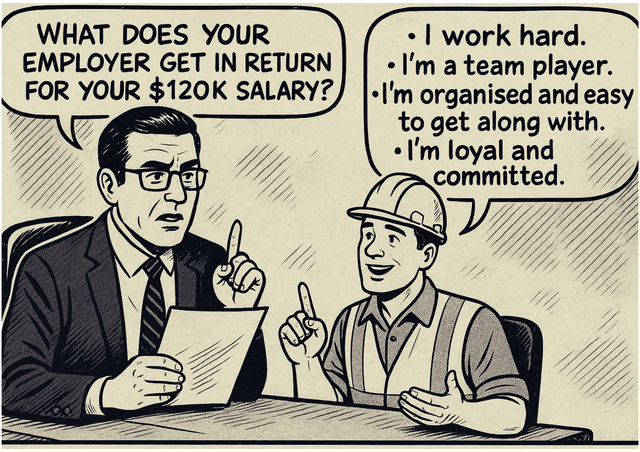

When I ask a candidate, "What does your employer get in return for your $120K salary?", the answers often sound something like this:
- "I work hard."
- "I'm a team player."
- "I'm organised and easy to get along with."
- "I'm loyal and committed."
Now, all of these are good traits. But they're generic. They don't separate you from any of the other applicants. They also don't help the employer understand what you can actually deliver in the role.
Hiring managers and recruiters want evidence of impact (we used to refer to it as searching for a candidate's USP when I first learnt how to interview candidates, as a Recruiter). The people who can provide that evidence, with specifics, stand out instantly. It all starts with understanding your true capability and being able to speak about it clearly and without ego.
Know What You're Good At — And Why

Let's say you're a Contract Administrator with three years of experience on $100,000. If you're preparing for a review or job interview, you should be able to say something like:
"I've built strong relationships with trades, particularly our structural and façade contractors. That's helped me pre-empt risk points and manage scopes more tightly. On our last two projects, I flagged potential variations early and worked with the PM to avoid them. One of those alone saved us about $40K."
That's specific. It shows commercial thinking. It connects your actions to actual outcomes. It builds trust with the interviewer because you're not just offering traits, you're offering value.
If you're a less experienced professional, you need to be aware of these types of wins – and record them, to refer back to in the future. Those more experienced, should be able to (with some thought and consideration) cite and reference these situations, actions and outcomes, easily – after all, more experienced operators (particularly high performers) who are typically on higher salaries, are paid more, because they can effect more positive outcomes for their employer (it's just a matter of being "aware" of them, and being able to recollect and articulate these experiences).
By contrast, if you simply say "I'm organised" or "I get on with everyone", you're in the same boat as dozens of others. It's true, but not memorable.

Let's say you're a Contract Administrator with three years of experience on $100,000. If you're preparing for a review or job interview, you should be able to say something like:
"I've built strong relationships with trades, particularly our structural and façade contractors. That's helped me pre-empt risk points and manage scopes more tightly. On our last two projects, I flagged potential variations early and worked with the PM to avoid them. One of those alone saved us about $40K."
That's specific. It shows commercial thinking. It connects your actions to actual outcomes. It builds trust with the interviewer because you're not just offering traits, you're offering value.
If you're a less experienced professional, you need to be aware of these types of wins – and record them, to refer back to in the future. Those more experienced, should be able to (with some thought and consideration) cite and reference these situations, actions and outcomes, easily – after all, more experienced operators (particularly high performers) who are typically on higher salaries, are paid more, because they can effect more positive outcomes for their employer (it's just a matter of being "aware" of them, and being able to recollect and articulate these experiences).
By contrast, if you simply say "I'm organised" or "I get on with everyone", you're in the same boat as dozens of others. It's true, but not memorable.
Weaknesses Aren't a Liability — If You Know How to Talk About Them
Another major mistake people make is pretending they have no weaknesses or dodging the question with something fluffy. "I care too much" is not a weakness. It's a cop-out.
Being self-aware means owning where you need to improve and showing that you're already working on it. That makes you more coachable, more grounded, and a far more trustworthy hire.
For example:
"Early in my career, I was too slow getting subcontracts finalised, which exposed us to scope creep. I learned to be more proactive, and now I schedule those reviews into my week by default. It's helped tighten our cost control and improve trade accountability."
That kind of response is not a red flag. It's an insight into how you think, how you learn, and how you evolve. Hiring managers value that more than you might think.


Another major mistake people make is pretending they have no weaknesses or dodging the question with something fluffy. "I care too much" is not a weakness. It's a cop-out.
Being self-aware means owning where you need to improve and showing that you're already working on it. That makes you more coachable, more grounded, and a far more trustworthy hire.
For example:
"Early in my career, I was too slow getting subcontracts finalised, which exposed us to scope creep. I learned to be more proactive, and now I schedule those reviews into my week by default. It's helped tighten our cost control and improve trade accountability."
That kind of response is not a red flag. It's an insight into how you think, how you learn, and how you evolve. Hiring managers value that more than you might think.
"Be the Real Deal"
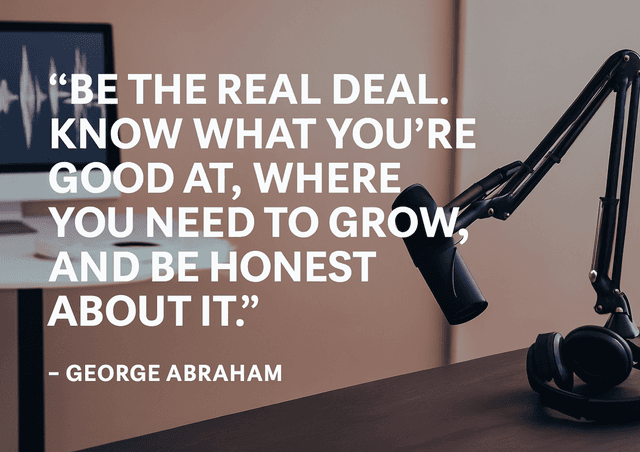
I interviewed George Abraham, Managing Director of Hickory, on the podcast not long ago. He summed it up perfectly when he said:
"Be the real deal. Know what you're good at, where you need to grow, and be honest about it."
It's a simple message, but it cuts through.
We're living in a time where most candidates know how to sound good. They've watched the YouTube tutorials and read the LinkedIn posts on how to win an interview. But very few actually know how to back up their pitch with examples, numbers, and real reflection.
And here's the problem. Every candidate sounds confident. Every project manager says their projects have made money. Nobody ever says, "Actually, one project went backwards and I learned a lot from it."
That's a missed opportunity. Self-awareness isn't about pointing out your flaws for the sake of it. It's about showing that you understand the full picture and you're mature enough to reflect, adjust, and grow.
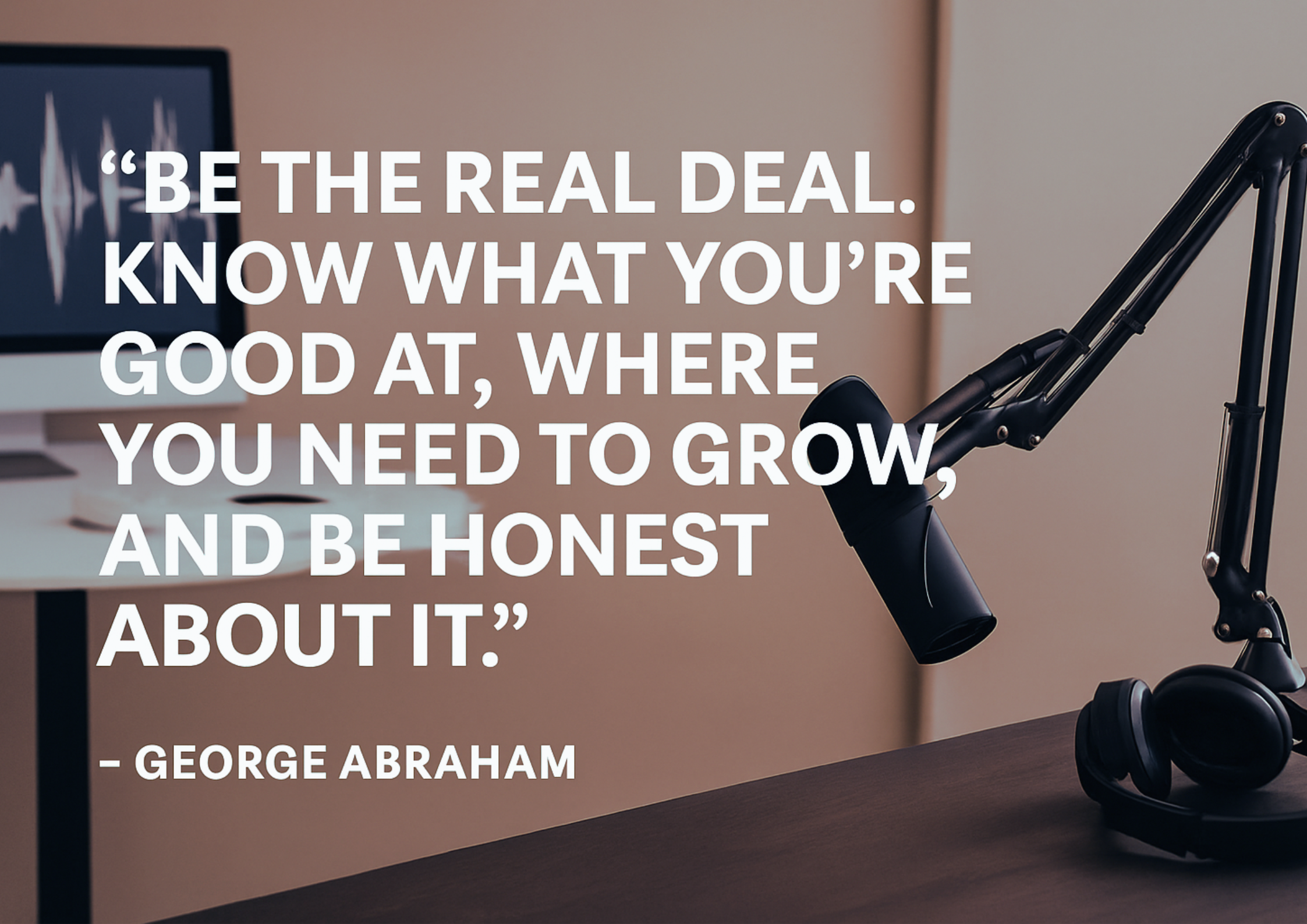
I interviewed George Abraham, Managing Director of Hickory, on the podcast not long ago. He summed it up perfectly when he said:
"Be the real deal. Know what you're good at, where you need to grow, and be honest about it."
It's a simple message, but it cuts through.
We're living in a time where most candidates know how to sound good. They've watched the YouTube tutorials and read the LinkedIn posts on how to win an interview. But very few actually know how to back up their pitch with examples, numbers, and real reflection.
And here's the problem. Every candidate sounds confident. Every project manager says their projects have made money. Nobody ever says, "Actually, one project went backwards and I learned a lot from it."
That's a missed opportunity. Self-awareness isn't about pointing out your flaws for the sake of it. It's about showing that you understand the full picture and you're mature enough to reflect, adjust, and grow.
Where to Start: Building Career Self-Awareness
This doesn't need to be complicated. Here's how to start building that insight.
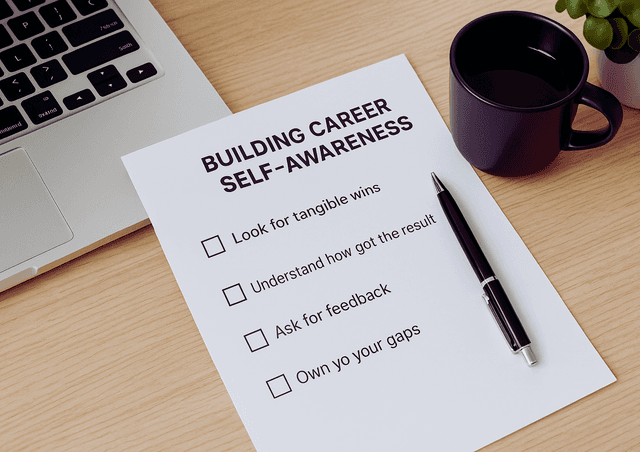
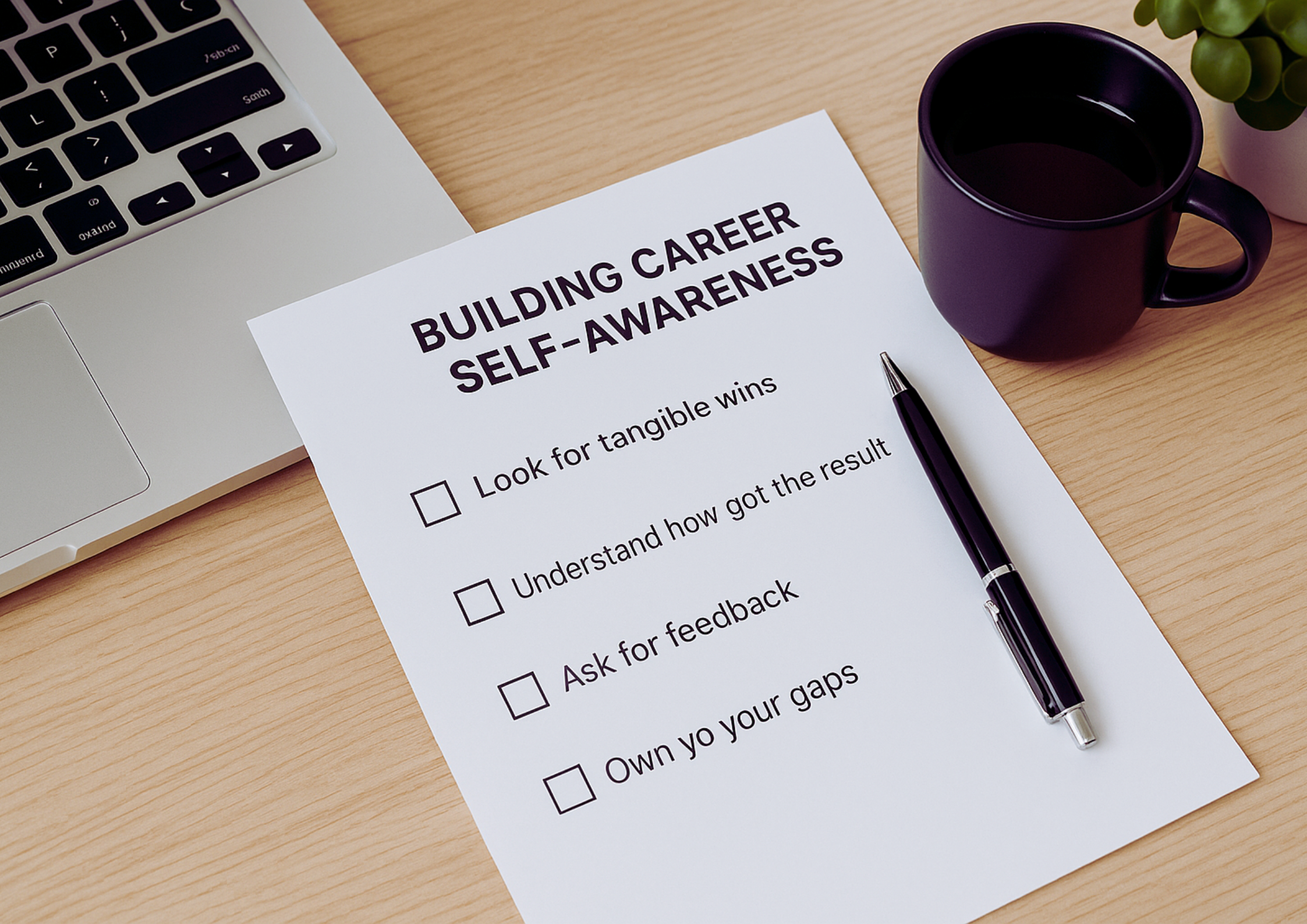
This doesn't need to be complicated. Here's how to start building that insight.
1. Look for tangible wins.
Ask yourself:
- Where have I saved the business money?
- What problems have I solved?
- What risks have I helped manage?
- Can I quantify the outcome of my work?
For example, if you're a PM and you helped shift a project from a forecasted loss to a small profit, break it down. What did you do? What was the financial gain? Did you renegotiate with trades? Uncover variation opportunities? Streamline workflow?
2. Understand how you got the result.
It's not enough to say, "I build strong relationships." Ask:
- Who with?
- How do you approach those conversations?
- What's the benefit of those relationships?
3. Ask for feedback.
Speak to your manager or peers and ask:
- What do you think I'm strong at?
- Where do I need to develop further?
- What kind of problems do others ask me to help with?
Use that to sharpen your self-assessment and see how your view lines up with others.
4. Own your gaps.
If you're light on experience in a certain area, say so. And explain how you're bridging that gap. For example:
"I haven't managed the full design phase solo, but I've been involved in consultant coordination and want to step into a lead role in the next 6–12 months."
That shows ambition, not weakness.
Final Thought: Know Where You Are to Know Where You're Going
Your career is like a GPS. You can't map out the route until you know exactly where you're starting from. Being honest about where you are today, technically and professionally, is the first step to figuring out how to get to where you want to go.
That honesty builds trust with your manager, helps you stand out in interviews, and gives your career planning a solid foundation. It positions you as someone who is not only skilled, but self-aware and future-ready. That's someone worth backing.
Know your strengths. Understand your weaknesses. And be the real deal.